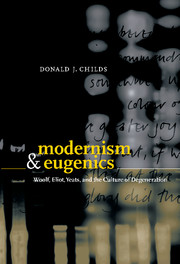Book contents
- Frontmatter
- Contents
- Introduction
- Chapter 1 Virginia Woolf's hereditary taint
- Chapter 2 Boers, whores, and Mongols in Mrs. Dalloway
- Chapter 3 Body and biology in A Room of One's Own
- Chapter 4 Eliot on biology and birthrates
- Chapter 5 To breed or not to breed: the Eliots' question
- Chapter 6 Fatal fertility in The Waste Land
- Chapter 7 The late eugenics of W.B. Yeats
- Chapter 8 Yeats and stirpiculture
- Chapter 9 Yeats and The Sexual Question
- Notes
- Index
Chapter 5 - To breed or not to breed: the Eliots' question
Published online by Cambridge University Press: 22 September 2009
- Frontmatter
- Contents
- Introduction
- Chapter 1 Virginia Woolf's hereditary taint
- Chapter 2 Boers, whores, and Mongols in Mrs. Dalloway
- Chapter 3 Body and biology in A Room of One's Own
- Chapter 4 Eliot on biology and birthrates
- Chapter 5 To breed or not to breed: the Eliots' question
- Chapter 6 Fatal fertility in The Waste Land
- Chapter 7 The late eugenics of W.B. Yeats
- Chapter 8 Yeats and stirpiculture
- Chapter 9 Yeats and The Sexual Question
- Notes
- Index
Summary
Eliot's close attention to MacBride's “Study of Heredity” and his survey of issues in eugenics in general through his reading of the 1916–17 issues of The Eugenics Review and Shield coincided with events in his personal life that made him extremely conscious of his eugenic responsibilities and reinforced his sense of what Foucault identifies as late nineteenth-century bourgeois obligations to safeguard family blood:
The concern with genealogy became a preoccupation with heredity; but included in bourgeois marriages were not only economic imperatives and rules of social homogeneity, not only the promises of inheritance, but the menaces of heredity; families wore and concealed a sort of reversed and somber escutcheon whose defamatory quarters were the diseases or defects of the group of relatives – the grandfather's general paralysis, the mother's neurasthenia, the youngest child's phthisis, the hysterical or erotomaniac aunts, the cousins with bad morals.
Perhaps Eliot's poetic scrutiny of Aunt Helen, Cousin Harriet, and Cousin Nancy ironically acknowledges the menaces of heredity. Certainly his own marriage forced him to acknowledge this menace. On the one hand, his marriage to Vivien Haigh-Wood forced him to confront the possibility that her various health problems were heritable. On the other hand, his medical classification as “unfit” when applying to join the US navy forced him to contemplate defects in his own physical constitution at a time when the valiant soldier was being celebrated as eugenically ideal stock.
- Type
- Chapter
- Information
- Modernism and EugenicsWoolf, Eliot, Yeats, and the Culture of Degeneration, pp. 99 - 120Publisher: Cambridge University PressPrint publication year: 2001



